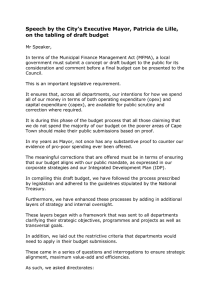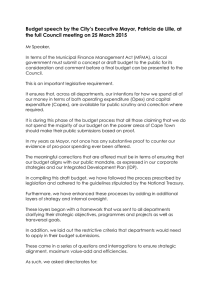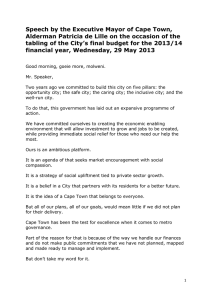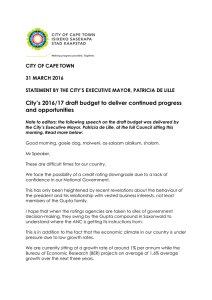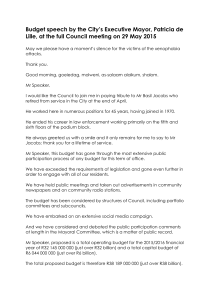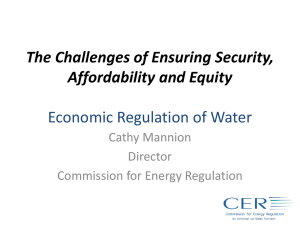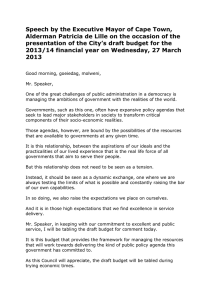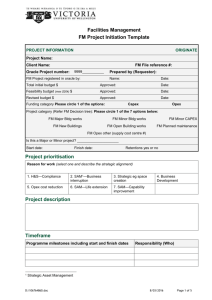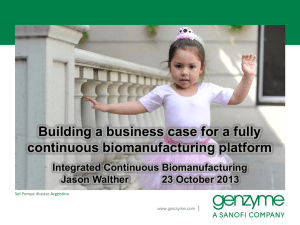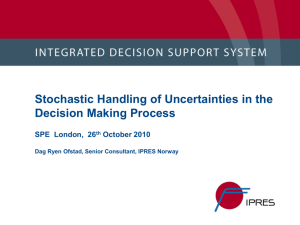Speech by the City’s Executive Mayor, Patricia de Lille, at... special Council meeting for the tabling of the City’s draft...
advertisement
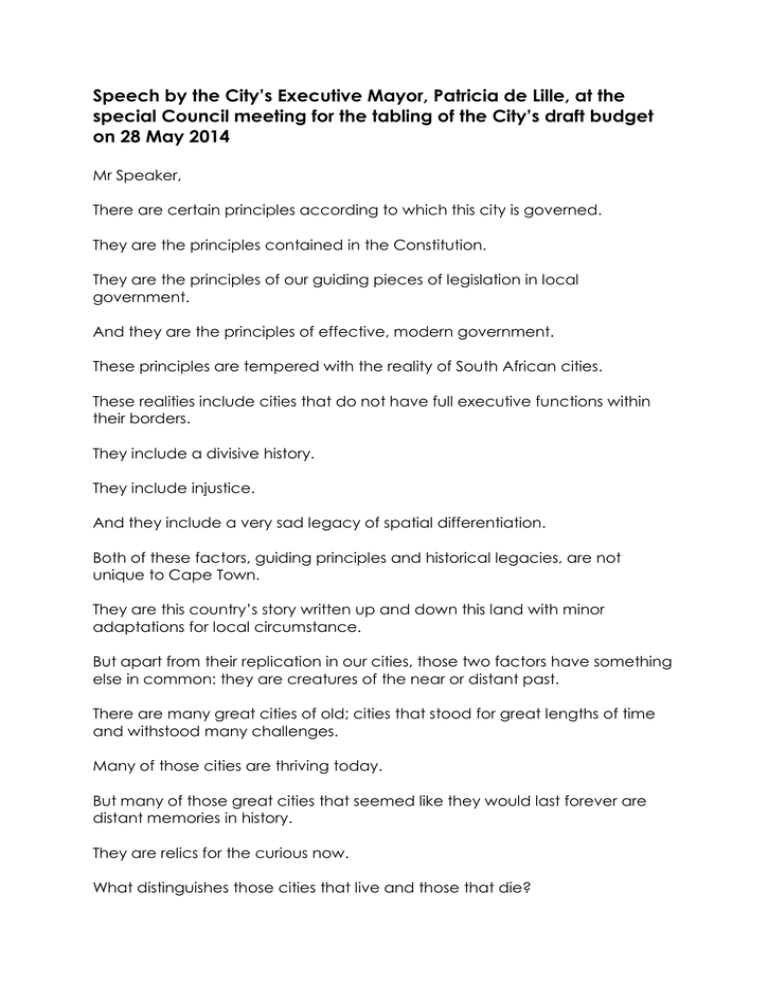
Speech by the City’s Executive Mayor, Patricia de Lille, at the special Council meeting for the tabling of the City’s draft budget on 28 May 2014 Mr Speaker, There are certain principles according to which this city is governed. They are the principles contained in the Constitution. They are the principles of our guiding pieces of legislation in local government. And they are the principles of effective, modern government. These principles are tempered with the reality of South African cities. These realities include cities that do not have full executive functions within their borders. They include a divisive history. They include injustice. And they include a very sad legacy of spatial differentiation. Both of these factors, guiding principles and historical legacies, are not unique to Cape Town. They are this country’s story written up and down this land with minor adaptations for local circumstance. But apart from their replication in our cities, those two factors have something else in common: they are creatures of the near or distant past. There are many great cities of old; cities that stood for great lengths of time and withstood many challenges. Many of those cities are thriving today. But many of those great cities that seemed like they would last forever are distant memories in history. They are relics for the curious now. What distinguishes those cities that live and those that die? Those that live build on their past and are not trapped by it. Those that live see difficulties as challenges to grow stronger and not to be blocked with. Those that live see the future, plan for it, and then manage their resources accordingly. That is the crucial difference that sets Cape Town apart: our ability to use our past constructively as a means of finding our way to a better future. It is that ability which makes South Africa not only world-class but, in an age where cities increasingly compete against each other especially in the developing world, the African city of the future today. In terms of the Municipal Finance Management Act (MFMA), a local government must submit a concept or draft budget to the public for its consideration and comment before a final budget can be presented to the Council. This is an important legislative requirement. It ensures that, across all departments, our intentions for how we spend all of our money in terms of both operating expenditure (opex) and capital expenditure (capex), are available for public scrutiny and correction where required. It is during this phase of the budget process that all those claiming that we do not spend the majority of our budget on the poorer areas of Cape Town should make their public submissions based on proof. In my years as Mayor, not once has any substantive proof to counter our evidence of pro-poor spending ever been offered. Indeed, yet again, our past few months of intense engagement have borne this observation out. In compiling this budget, we have followed the process prescribed by legislation and adhered to the guidelines stipulated by the National Treasury. Furthermore, we have enhanced these processes by adding in additional layers of strategy and internal oversight. These layers began with a framework that was sent to all departments clarifying their strategic objectives, programmes and projects as well as transversal goals. In addition, we laid out the restrictive criteria that departments would need to apply in their budget submissions. These came in a series of questions and interrogations to ensure strategic alignment, maximum value-add and efficiencies. As such, we asked directorates: What is needed to execute the City’s strategy in your directorate What resources are needed and what prioritisations are required What exclusions need to be made and what expenditure repurposing is required What revenue can be sourced What efficiencies can be achieved What additional revenues can be sourced What business improvement processes can be undertaken An indication of where staff vacancies have been cut Indications of plans to adhere to service delivery standards with reduced resources And capital spending programmes in the MTREF period, with indications of how capital spending is occurring sustainably with expenditure on asset maintenance as per National Treasury guidelines. After a rigorous process of budget submissions and debate, we have arrived at the budget submitted to Council. In total, the proposed opex budget is approximately R28 billion and the proposed capex budget is just over R6 billion. In terms of capex, we have split our costs between new and renewed capital projects by R3,5 billion in the case of the new assets and projects and R2,5 billion in the case of existing assets and projects, achieving a desirable split between new investments and looking after existing assets – a split that is consistent with the prescriptions of the National Treasury. Major proposed capex funding within the opportunity city includes funding for the Bellville Transfer Station; IRT acquisitions; and a new electricity depot. In addition, the City continues to give action to its Infrastructure-led Growth Strategy by investing in the Broadband Telecommunication infrastructure programme. This new class of municipal infrastructure is critical to the success, competitiveness and growth of the City and directly supports both our Economic and Social Development Strategies. This network already connects more than 140 City facilities and 43 Western Cape Government facilities via high-speed fibre and wireless connections. This year we also saw the first commercial telecoms service providers start using this infrastructure to provide services to their clients – in line with the City’s objective to make spare capacity available in support of our economic development objectives. In the current financial year, this investment has helped remove more than R25 million worth of expenditure from the City’s operating budget and, although modest for now, has already started generating new revenue of R7,6 million. In 2014/15 our budget provides a record amount of R216 million, funded from both internal and external sources, for the further roll-out of the City’s broadband network. Propositions for the caring city include: land acquisition; Council rental stock upgrades; the second phase of the Garden Cities project; and the Macassar and Gugulethu housing projects. Proposed projects for the inclusive city include: funds for the Mayoral redress programme; the new regional library in Kuyasa, Khayelitsha; and the Strand Pavilion Precinct Upgrade. The safe city sees additional capital allocated to the Safety and Security Directorate to fulfil law enforcement requirements. Furthermore, approximately R200 million will go to the Urbanisation Department within Human Settlements for the financing of capex projects that directly relate to the provision of infrastructure for informal settlements. This is an addition to our roll-out of services across directorates for informal settlements. Within the opex budget, an increase would go to the City Manager to implement a common project management methodology across the City to improve the technical capacity of our service delivery. Compliance and Auxiliary Services has a proposed increase to cater for urban regeneration and sufficiently fund our municipal court system. Finance and Economic, Environmental and Spatial Planning would also receive additional funds to help with numerous data clean-up operations that will assist us in understanding property distributions across the city and further enhance our revenue-generating capacity. We further propose additional funds to Human Settlements to finance the Anti-Land Invasion Unit and to Safety and Security for Neighbourhood Watch and Safety Officers as well as the Reservist programme. Further funds are proposed for the Expanded Public Works Programme (EPWP) and for Solid Waste Management to implement a weekend refuse removal programme in informal settlements. In addition, the repairs and maintenance budget of Transport for Cape Town would also be increased to address necessary road repairs across the city. And perhaps most significantly, a substantial increase to Social Development and Early Childhood Development to increase the capacity of trained staff; ECD roll-out; and the refurbishment of existing facilities. In total, for our service delivery budget, our proposed budget would see 67% of our spending be targeted towards the poor in the city – a powerful testament to this government’s commitment to reconciliation through substantive redress measures. Residents will also continue to benefit from our package of free basic services. Residents with properties below R400 000, with degrees of packages cascading down to properties below R100 000, or who earn a monthly income of below R3 500 are able to benefit from our package of free subsidised services and rates rebates, while all property owners enjoy a measure of free service according to our block tariff procedures. Those earning between R3 501 and R4 000 also benefit from a 75% rebate on rates. Senior citizens and disabled people also enjoy rates rebates where monthly income is below R12 000. And in terms of our proposed rates and service charge increases, we have kept our increases as low as possible and as close to the Consumer Price Index of 5,9 as we can in order to ensure that, in difficult times, we do not pass on additional burdens to the consumer. As such, we propose the following charges: Rates: 6% Electricity: 7,6% Water and Sanitation: 8% Solid Waste: 5,9% This is a reduction in the increases from last year, which were as follows: A rates increase of 6,10% A sanitation increase of 9,53% A water increase of 9,53% An electricity increase of 7,86% At a directorate level, the spending outlined in the budget is as follows: City Health: just under R22 million in capex; R907 million opex City Manager: just under R7 million in capex; R132 million opex Community Services: approximately R242 million in capex; R1,5 billion opex Compliance and Auxiliary Services: R13 million in capex; R592 million opex Corporate Services: just under R360 million in capex; R1,6 billion opex Economic, Environment and Spatial Planning: nearly R120 million in capex; R545 million opex Finance: around R105 million in capex; R2 billion opex Human Settlements: nearly R700 million in capex; R1,8 billion opex Safety and Security: over R70 million in capex; R1,6 billion opex Social Development and Early Childhood Development: R18 million in capex; R137 million opex Tourism, Events and Marketing: R37 million in capex; R482 million opex Transport for Cape Town: nearly R1,7 billion in capex; R2,2 billion opex Utility Services: over R2,8 billion in capex; R3,5 billion opex This draft budget proposed today is fully balanced and fully funded. While it will certainly enable us to give life to our historic mandate, we should pause and think about its sustainability for the future. We have kept all service and rates charges to an absolute minimum and we seek alternative means of raising external financing for many of our projects. However, amidst all of this, we are compelled to pay bulk charges for key services, such as electricity from external providers. This forces us to immediately charge a bare minimum for this key service charge without even accounting for the premium we have to add in order to simply maintain our network. In addition to this, the annual allocation we receive from the national government in the form of equitable share, money which comes from Cape Town’s tax base in part, is insufficient to meet the growing service needs of our population. This problem is made especially more pronounced by the fact that while people are moving to Cape Town in search of opportunities as confirmed by the Census, national government is giving more money to smaller municipalities away from the metros. This model is not sustainable and while we have been able to get away with it for several years, the time for re-evaluation for all partners is now, especially for national government. We need increased devolution to metropolitan municipalities to source our own energy sources and define our own spending of taxes and increased allocations of revenue to be able to carry the service delivery demands placed upon us. In conclusion, the document before us today is fully in line with our strategic vision for the City. It adequately funds our five pillars and ensures that we commit ourselves to redress and reconciliation, while taking the lead in driving economic and social development in the metro region. I hope that we all take note of its provisions and communicate these to our communities. Furthermore, let us stand together as a Council to urge a public debate on the funding model for municipalities. The future requires nothing less than our total commitment to a new service delivery compact in order to make progress possible, together. I hereby table the budget, as amended. Thank you, baie dankie, enkosi.
